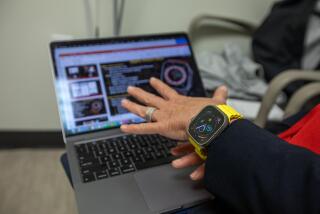Medic Alert Looks to High Tech in 4th Decade
- Share via
TURLOCK, Calif. — Medic Alert, which warns health professionals about a person’s health problems, is sticking to its “low-tech” roots while experimenting with high technology.
The centerpiece of the Turlock-based nonprofit medical warning system remains a simple bracelet with an engraved metal badge. Etched on the badge are a few words that can save a life or reduce the cost of medical care.
“For those first few critical moments, you have to have something to alert (a doctor or paramedic) so they will know special treatment is required,” said Ken Harms, Medic Alert Foundation president.
The early warning system is popular with diabetics, people with heart ailments, asthma, hypertension or who are allergic to drugs such as penicillin.
Harms says these simple “low-tech” bracelets have saved about 45,000 lives and helped speed up medical treatment and accurate diagnosis about 20% of the time.
Medic Alert representatives from 19 foreign countries will gather in Turlock next month to discuss how to improve the system which has 2.6 million members.
The gathering at Medic Alert’s Turlock headquarters will be a vivid illustration of how this idea of Dr. Marion Collins in 1953 has gained such international popularity.
Collins’ daughter, Linda, nearly died that year from a allergic reaction to tetanus antitoxin given to her for a finger cut. Collins was so shocked by the near-tragedy that he devised a bracelet for his daughter which said “allergic to horse serum.”
Friends and family with medical problems thought Linda’s bracelet was a good idea, so Collins made them in his home until national publicity hit. Medic Alert Foundation was formed in 1956 to respond to the escalating demand.
What began in Collins’ home has expanded into a $7-million annual nonprofit foundation housed in a 32,000-square-foot building with 110 employees in this San Joaquin Valley city 100 miles southeast of San Francisco.
Harms said the company is looking into a system where a doctor can use a plastic card with a magnetic stripe to obtain access to a computer memory bank with the patient’s medical records. This high-tech system would complement the bracelet and wallet cards with medical information now issued to members.
More to Read
Sign up for Essential California
The most important California stories and recommendations in your inbox every morning.
You may occasionally receive promotional content from the Los Angeles Times.













